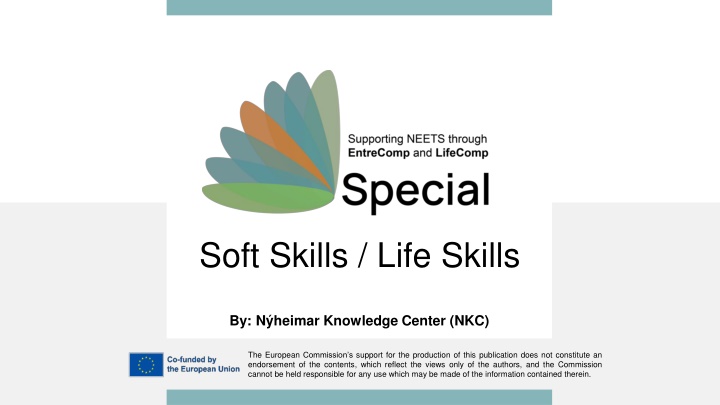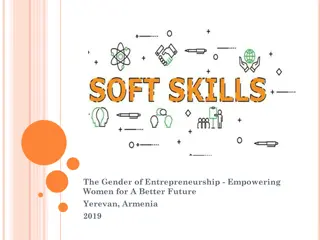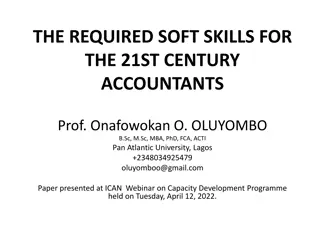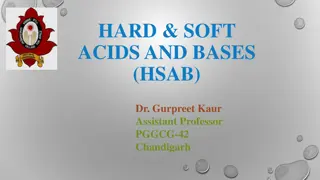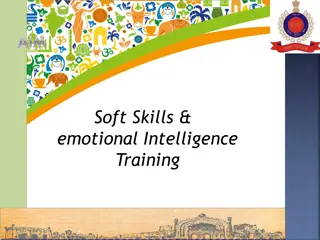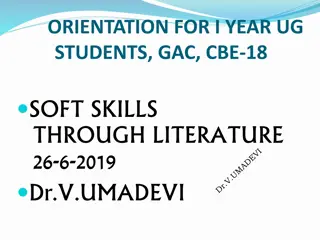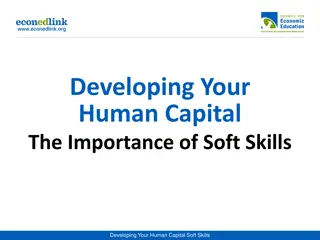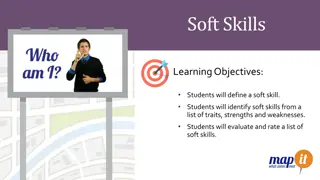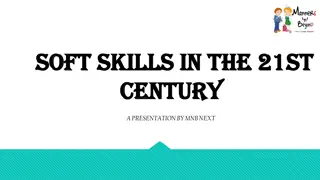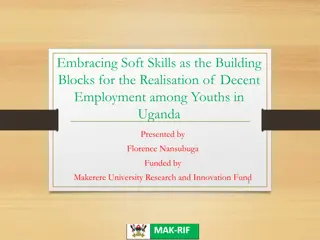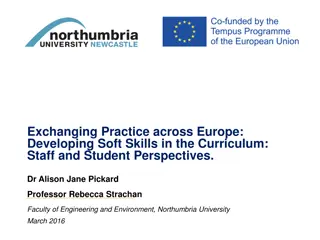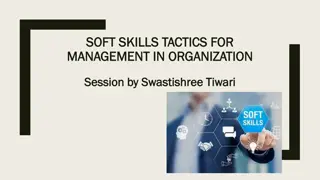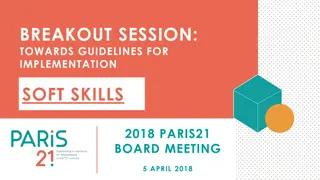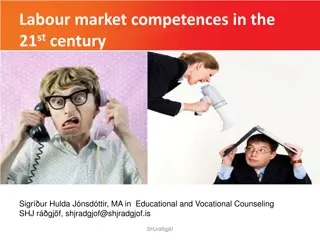Soft Skills and Life Skills Overview
Soft skills, also known as life skills or people skills, encompass interpersonal and social abilities that enable effective interaction with others. They are acquired through daily life experiences and reflections, in contrast to hard skills gained through formal education. This overview delves into the importance and examples of soft skills, including effective communication, assertiveness, self-motivation, flexibility, adaptability, creative thinking, and problem-solving. Additionally, the index highlights empowerment, goal setting, and social skills, providing definitions, benefits, and strategies for development.
Download Presentation

Please find below an Image/Link to download the presentation.
The content on the website is provided AS IS for your information and personal use only. It may not be sold, licensed, or shared on other websites without obtaining consent from the author.If you encounter any issues during the download, it is possible that the publisher has removed the file from their server.
You are allowed to download the files provided on this website for personal or commercial use, subject to the condition that they are used lawfully. All files are the property of their respective owners.
The content on the website is provided AS IS for your information and personal use only. It may not be sold, licensed, or shared on other websites without obtaining consent from the author.
E N D
Presentation Transcript
Soft Skills / Life Skills By: N heimar Knowledge Center (NKC) The European Commission s support for the production of this publication does not constitute an endorsement of the contents, which reflect the views only of the authors, and the Commission cannot be held responsible for any use which may be made of the information contained therein. The European Commission's support for the production of this publication does not constitute an endorsement of the contents, which reflect the views only of the authors, and the Commission cannot be held responsible for any use which may be made of the information contained therein.
Introduction: Soft skills Let s start with taking a look at the concept! o o o o Also called life skills or people skills A combination of interpersonal and social skills Allow someone to interact effectively and easily with others Hard skills are learned through formal training and education, while the soft skills are obtained throughout daily life, personal experiences and reflections The European Commission's support for the production of this publication does not constitute an endorsement of the contents, which reflect the views only of the authors, and the Commission cannot be held responsible for any use which may be made of the information contained therein.
Introduction: Soft skills Examples (EucA, 2014) 01 04 Effective Communication Assertiveness/Decision Making 02 05 Self Motivation Flexibility/Adaptability 03 06 Creative Thinking Problem Solving The European Commission's support for the production of this publication does not constitute an endorsement of the contents, which reflect the views only of the authors, and the Commission cannot be held responsible for any use which may be made of the information contained therein.
Index Today's focal points 01 Empowerment Definition, benefits and how to get there 02 Goal Setting Definition, benefits and how to get there 03 Social Skills Definition, benefits and how to get there The European Commission's support for the production of this publication does not constitute an endorsement of the contents, which reflect the views only of the authors, and the Commission cannot be held responsible for any use which may be made of the information contained therein.
EMPOWERMENT What is it? The empowerment concept is twofold. It covers both a) the process of gaining power and freedom to follow your desires or to control what happens to you and b) the process of giving said power or freedom to a group of people The European Commission's support for the production of this publication does not constitute an endorsement of the contents, which reflect the views only of the authors, and the Commission cannot be held responsible for any use which may be made of the information contained therein.
Three pillars of empowerment Benefits of empowerment in action (based on Shier, 2019) knowledge, skills, autonomy ? Capability confidence, assertiveness, courage ? Positive mindset respect, teamwork, good leadership ? Supportive context The European Commission's support for the production of this publication does not constitute an endorsement of the contents, which reflect the views only of the authors, and the Commission cannot be held responsible for any use which may be made of the information contained therein.
How to get there? What can YOU do to achieve empowerment? Trust your abilities and your instinct. Use positive self-talk. Don't be afraid to face challenges. Consider what you want to achieve. Use the SMART goals model and commit to your goal. Set Improve conditions Don t give up! Acquire capability Get to know your community and its social groups. Network. Stay curious and ask questions. Change mindset reasonable goals Align expectations with authority (teacher, boss, parents). Establish teamwork. Just keep swimming babyyy! The European Commission's support for the production of this publication does not constitute an endorsement of the contents, which reflect the views only of the authors, and the Commission cannot be held responsible for any use which may be made of the information contained therein.
GOAL SETTING What is it? Goal setting is the process of finding out what you want to accomplish, and aiming for it over a certain period is a strategy that raises productivity and performance guides you away from wishful thinking! goal setting theory and methods can help you to achieve your chosen goal The European Commission's support for the production of this publication does not constitute an endorsement of the contents, which reflect the views only of the authors, and the Commission cannot be held responsible for any use which may be made of the information contained therein.
The SMART model For goal setting T R A M S Time based Specific Relevant Measurable Attainable YOUR GOAL gets clarified and easier to achieve with the SMART tool The European Commission's support for the production of this publication does not constitute an endorsement of the contents, which reflect the views only of the authors, and the Commission cannot be held responsible for any use which may be made of the information contained therein.
Obstacles on your way towards the goal What can you do? The SMART model makes it all look so easy! But there will probably be obstacles... Are there any tools out there to help you with that? Yes! The IDEAL model will guide you through the problem. The European Commission's support for the production of this publication does not constitute an endorsement of the contents, which reflect the views only of the authors, and the Commission cannot be held responsible for any use which may be made of the information contained therein.
IDEAL Problem Solving Model I L Identify The real problem can be something other than what we see right now. Careful if pointing out a culprit. D Look back Define Look back and learn from this process! All experience is a After finding out what the problem is, analyze what is causing it lesson. Action Explore A E Choose an action and try it out. If it doesn t solve the issue at hand, try the next one. What possible solutions are there, and which actions can you take (as a team)? The European Commission's support for the production of this publication does not constitute an endorsement of the contents, which reflect the views only of the authors, and the Commission cannot be held responsible for any use which may be made of the information contained therein.
SOCIAL SKILLS What is it? Our social skills are the skills we have learned through communicating with other people, and enable us to interact appropriately and capably in different social contexts They include assertiveness, communication, conflict resolution, coping and the ability to regulate one s behaviour and feelings The European Commission's support for the production of this publication does not constitute an endorsement of the contents, which reflect the views only of the authors, and the Commission cannot be held responsible for any use which may be made of the information contained therein.
SOCIAL SKILLS Benefits Having good social skills has countless benefits for you and your society! However, let s list two concrete points. By nurturing your social skills, you: 1. 2. 3. improve your communication, and good communication is the key to progress improve your emotional intelligence empower yourself to be the protagonist of your own story, to make something happen! The European Commission's support for the production of this publication does not constitute an endorsement of the contents, which reflect the views only of the authors, and the Commission cannot be held responsible for any use which may be made of the information contained therein.
Four important social skills for you to equip yourself with! Communication Express yourself! Share your ideas and feelings and show interest in others. Empathy Listen actively, hold back judgement. Show understanding and empathetic body language. Assertiveness Don t be passive or aggressive. Express yourself with confidence and respect. Conflict resolution Don t be afraid of a conflict. Through cooperation you will find a solution (remember the IDEAL problem solving model) The European Commission's support for the production of this publication does not constitute an endorsement of the contents, which reflect the views only of the authors, and the Commission cannot be held responsible for any use which may be made of the information contained therein.
Communication Social skills Communication Face to face communication has proven more meaningful than online communication. The togetherness plays an important role. The body language, facial expressions, the ways of talking (tone of voice, pauses, different stress on words) etc. (Dupuis and Ramsey, 2011; O Day and Heimberg, 2021; Vasanthakumari, 2019) The European Commission's support for the production of this publication does not constitute an endorsement of the contents, which reflect the views only of the authors, and the Commission cannot be held responsible for any use which may be made of the information contained therein.
Communication Social skills Communication Capability in communication has two aspects; skills of enquiry and skills of persuasion. Skills of enquiry: 1. Paying attention to what is being said 2. Treating the speaker as an equal 3. Cultivating ease and encouragement 4. Asking carefully thought and formulated questions 5. Rationing information 6. Giving positive feedback Skills of persuasion: 1. Appeal to the audiences reason and emotions 2. Find the appropriate style in language, visuals and other non-verbal communication (considering who your audience are, what they already know, what the setting is and the time of your communication) 3. Identify the core idea, and arrange your ideas logically 4. Deliver your ideas 5. Use tools such as effective eye contact and metaphors (Barker, 2010) The European Commission's support for the production of this publication does not constitute an endorsement of the contents, which reflect the views only of the authors, and the Commission cannot be held responsible for any use which may be made of the information contained therein.
Empathy Social skills Empathy To nurture your empathic abilities consider other people's feelings and emotions read stories about people, (true stories and fiction), to gain insight into other person's state of feelings and thoughts step out of your comfort zone examine and question your biases when someone is having a difficult time join them in their difficulty Bren Browns take on empathy is very enlightening: https://www.youtube.com/watch?v=1Evwgu369Jw The European Commission's support for the production of this publication does not constitute an endorsement of the contents, which reflect the views only of the authors, and the Commission cannot be held responsible for any use which may be made of the information contained therein.
Assertiveness Social skills Assertiveness Assertiveness requires self knowledge: get to know your own emotions, values and principles confidence: believe in yourself and voice your opinions that you regulate your emotions you saying no when relevant! But do it respectfully and with arguments using I statements, such as: I feel we should instead of We should , or I think this is instead of This is Respect is crucial when it comes to assertiveness. You have to respect your own beliefs, but also the other parts standpoint! The European Commission's support for the production of this publication does not constitute an endorsement of the contents, which reflect the views only of the authors, and the Commission cannot be held responsible for any use which may be made of the information contained therein.
Conflict Resolution Social skills Conflict resolution For a successful conflict resolution you need all the mentioned social skills: communication: active listening along with clear and respectful expression empathy: REALLY consider the other parts emotions assertiveness: stay true to your own emotions and principles Don t be afraid to change your mind and develop compromises. Aaand remember the IDEAL problem solving model! It comes in handy in many situations The European Commission's support for the production of this publication does not constitute an endorsement of the contents, which reflect the views only of the authors, and the Commission cannot be held responsible for any use which may be made of the information contained therein.
IDEAL Problem Solving Model I L Identify The real problem can be something other than what we see right now. Careful if pointing out a culprit. D Look back Define Look back and learn from this process! All experience is a After finding out what the problem is, analyze what is causing it lesson. Action Explore A E Choose an action and try it out. If it doesn t solve the issue at hand, try the next one. What possible solutions are there, and which actions can you take (as a team)? The European Commission's support for the production of this publication does not constitute an endorsement of the contents, which reflect the views only of the authors, and the Commission cannot be held responsible for any use which may be made of the information contained therein.
Quests Based on what you have studied in this unit, can you solve the exercises in the following slides? You will have to make decisions about complicated situations in which you will use the knowledge you have acquired. Take decisions Expand your thinking You will have to open your mind and think as if you were really in that situation, using your best tool: your brain. The European Commission's support for the production of this publication does not constitute an endorsement of the contents, which reflect the views only of the authors, and the Commission cannot be held responsible for any use which may be made of the information contained therein.
Quest 1: Skill Development, Networking Introduction: What s this all about? Task: What s the activity? On this occasion, you will have to do some Internet users experience a dwindling active networking. Networking as a face to social network. face interaction, is great for the purpose of It is important to interact face to face with breaking the ice and practising your social other individuals, also new people. skills. The European Commission's support for the production of this publication does not constitute an endorsement of the contents, which reflect the views only of the authors, and the Commission cannot be held responsible for any use which may be made of the information contained therein.
Quest 1: Skill Development, Networking Learning outcomes: What will I learn? Process: What am I going to do? You will broaden your network and thereby your possibilities. Pick 5 questions. Use them as guideline in your conversations. Have one on one talks in the room. Write down noticeable answers. Repeat. Better communication skills and your self- awareness skills. You will feel empowered by overcoming the fear of mingling face to face with strangers. The European Commission's support for the production of this publication does not constitute an endorsement of the contents, which reflect the views only of the authors, and the Commission cannot be held responsible for any use which may be made of the information contained therein.
Quest 1: Skill Development, Networking Conclusion: What will I take home? You will learn, that with practice, you can overcome your unease about socialising with new people. You will learn how to network in real life. You can take it to the next level and team up with someone from your network - to make an idea a reality. You can also explore online platforms where people network for professional purposes, like for example Linkedin. The European Commission's support for the production of this publication does not constitute an endorsement of the contents, which reflect the views only of the authors, and the Commission cannot be held responsible for any use which may be made of the information contained therein.
Quest 2: Goal Setting and Public Speaking Introduction: What s this all about? Task: What s the activity? Quickly point down an idea to change the world, that aligns with your values. You are running for In 15 minutes, write a short speech about your (imagined) political aspirations towards that idea. president of the world ! You are to write and deliver your own Use the Election Speech Template provided in the resources section as a guide. election speech. Deliver your speeches. The European Commission's support for the production of this publication does not constitute an endorsement of the contents, which reflect the views only of the authors, and the Commission cannot be held responsible for any use which may be made of the information contained therein.
Quest 2: Goal Setting and Public Speaking Learning outcomes: What will I learn? Process: What am I going to do? You will learn how to define SMART goals. 1. 2. Make a strong introduction Define your imagined political goal with the SMART model. Illustrate the benefits of your plan. Convince the public of your qualities and moral values. End on an assertive aggressive) You will increase your knowledge of communication techniques and strategies 3. 4. You will improve your value of ideas and creativity. 5. note (not You will be empowered after conquering your fear of public speaking. The European Commission's support for the production of this publication does not constitute an endorsement of the contents, which reflect the views only of the authors, and the Commission cannot be held responsible for any use which may be made of the information contained therein.
Quest 2: Goal Setting and Public Speaking Conclusion: What will I take home? By writing your own speech, you will have a document that will allow you to revisit and use, in other circumstances of public speaking. The process teaches you that goal setting and ideology is crucial to the success of a speech. You will realise how important communication techniques are when it comes to persuasion and introducing your ideas and goals. You will hopefully go home with a feeling of empowerment, which comes with overcoming your insecurities and fears that come with public speaking. The European Commission's support for the production of this publication does not constitute an endorsement of the contents, which reflect the views only of the authors, and the Commission cannot be held responsible for any use which may be made of the information contained therein.
Quest 3: Solving a Conflict/Problem as a Team Introduction: What s this all about? Task: What s the activity? In this activity you will be given several problems/conflicts to work through in a purposeful way. A utopian world would be free from all problems and conflicts or would it? They are an inevitable and natural part of human interaction, and can be great opportunities for reframing, innovative thinking and to gain insight into diverse issues. When all the groups/pairs have selected a solution to these problems, you select one spokesperson for each group/pair, who introduces their thoughts to the rest of the group and teacher. The European Commission's support for the production of this publication does not constitute an endorsement of the contents, which reflect the views only of the authors, and the Commission cannot be held responsible for any use which may be made of the information contained therein.
Quest 3: Solving a Conflict/Problem as a Team Learning outcomes: What will I learn? Process: What am I going to do? You will be divided into groups of 2-3 participants. You will learn how to systematically use the IDEAL model and thereby increase your knowledge of conflict/problem solving. Find the compact guide to the IDEAL model under Resources (The IDEAL model). Your will improve your ability to listen actively to other people's ideas and acquire an improved social and empathic mindset. . You are given 4 fictional conflicts/problems to scrutinize via the IDEAL model. The European Commission's support for the production of this publication does not constitute an endorsement of the contents, which reflect the views only of the authors, and the Commission cannot be held responsible for any use which may be made of the information contained therein.
Quest 3: Solving a Conflict/Problem as a Team Conclusion: What will I take home? By solving these problems, along with a team, you have had a valuable lesson in problem solving and conflict resolution. You have hopefully realised that problems are there for us to solve them, and if you put your mind to it, you can. Furthermore you have worked on these cases in a team setting, and that in itself is a great exercise in communication. The European Commission's support for the production of this publication does not constitute an endorsement of the contents, which reflect the views only of the authors, and the Commission cannot be held responsible for any use which may be made of the information contained therein.
Self-assessment Multiple-choice questions: consolidate your learning Question 1: What are the characteristics of soft skills? a) Soft skills are taught in formal education. b) Soft skills are the skills that make you soft. c) Soft skills are learned through daily life and interaction. d) All are correct. Question 2: What does empowerment bring? a) Confidence. b) Increased productivity. c) Freedom to choose your path. d) All are correct. Question 3: What is NOT an element of the SMART Goal Setting model? a) Choosing a specific goal. b) Choosing a daring goal. c) Choosing a goal you can measure. d) Choosing a time based goal. The European Commission's support for the production of this publication does not constitute an endorsement of the contents, which reflect the views only of the authors, and the Commission cannot be held responsible for any use which may be made of the information contained therein.
Self-assessment Multiple-choice questions: consolidate your learning Question 5: What is the IDEAL model? a) A problem solving tool. b) An idea database. c) A tool for making your communication ideal. d) All are correct. Question 4: What does NOT characterise good communication? a) Delivering your ideas. b) Using appropriate non verbal and verbal language. c) Listening actively to what is being said. d) Making assumptions. The European Commission's support for the production of this publication does not constitute an endorsement of the contents, which reflect the views only of the authors, and the Commission cannot be held responsible for any use which may be made of the information contained therein.
Self-assessment Multiple-choice questions: consolidate your learning Question 1: What are the characteristics of soft skills? a) Soft skills are taught in formal education. b) Soft skills are the skills that make you soft. c) Soft skills are learned through daily life and interaction. d) All are correct. Question 2: What does empowerment bring? a) Confidence. b) Increased productivity. c) Freedom to choose your path. d) All are correct. Question 3: What is NOT an element of the SMART Goal Setting model? a) Choosing a specific goal. b) Choosing a daring goal. c) Choosing a goal you can measure. d) Choosing a time based goal. The European Commission's support for the production of this publication does not constitute an endorsement of the contents, which reflect the views only of the authors, and the Commission cannot be held responsible for any use which may be made of the information contained therein.
Self-assessment Multiple-choice questions: consolidate your learning Question 5: What is the IDEAL model? a) A problem solving tool. b) An idea database. c) A tool for making your communication ideal. d) All are correct. Question 4: What does NOT characterise good communication? a) Delivering your ideas. b) Using appropriate non verbal and verbal language. c) Listening actively to what is being said. d) Making assumptions. The European Commission's support for the production of this publication does not constitute an endorsement of the contents, which reflect the views only of the authors, and the Commission cannot be held responsible for any use which may be made of the information contained therein.
Summing up Soft Skills Empowerment Soft skills are obtained throughout daily life, personal experiences and reflections. They make interactions easier and more effective. You can increase your own empowerment. It will give you confidence in your own knowledge and skills and freedom to choose your own path. B A D C Goal Setting Social Skills Skills such as; communication, empathy, assertiveness and conflict resolution. Enable you to interact appropriately and capably in different social settings. The process of finding out what you want to accomplish, planning how to. Your goals will be clarified and easier to achieve with the SMART model and the IDEAL model. and The European Commission's support for the production of this publication does not constitute an endorsement of the contents, which reflect the views only of the authors, and the Commission cannot be held responsible for any use which may be made of the information contained therein.
Thank you! Continue your training path at www.projectspecial.eu! The European Commission's support for the production of this publication does not constitute an endorsement of the contents, which reflect the views only of the authors, and the Commission cannot be held responsible for any use which may be made of the information contained therein.
